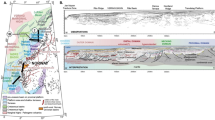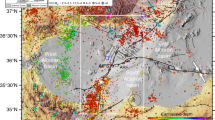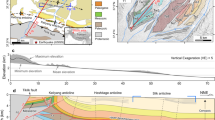Abstract
MR. WAYLAND in NATURE of August 25, p. 279, brings forward weighty arguments, based on the results of the Geological Survey of Uganda, to rebut the usually accepted view that the Protectorate, like most of eastern Africa, and probably western Africa as well, has been predominantly in a state of tension. I shall be surprised, however, if further work does not disclose the existence of at least some normal faulting with a north and south strike, showing the former existence of east and west tension. It may well be that compression and tension have more than once alternated with each other in Uganda. There is no reason, too, why a change of conditions may not convert a true rift valley formed in a period of tension into one bounded by reversed faults.
This is a preview of subscription content, access via your institution
Access options
Subscribe to this journal
Receive 51 print issues and online access
$199.00 per year
only $3.90 per issue
Buy this article
- Purchase on Springer Link
- Instant access to full article PDF
Prices may be subject to local taxes which are calculated during checkout
Similar content being viewed by others
Author information
Authors and Affiliations
Rights and permissions
About this article
Cite this article
EVANS, J. Continental Drift and the Stressing of Africa. Nature 112, 438–439 (1923). https://doi.org/10.1038/112438a0
Issue Date:
DOI: https://doi.org/10.1038/112438a0
Comments
By submitting a comment you agree to abide by our Terms and Community Guidelines. If you find something abusive or that does not comply with our terms or guidelines please flag it as inappropriate.



